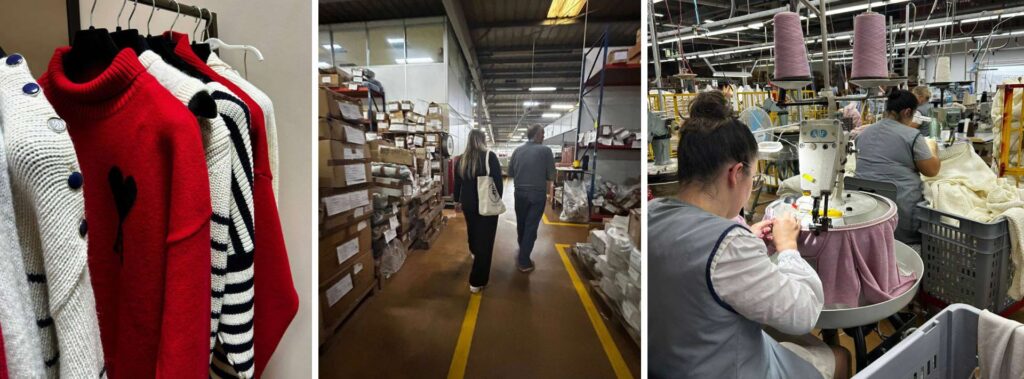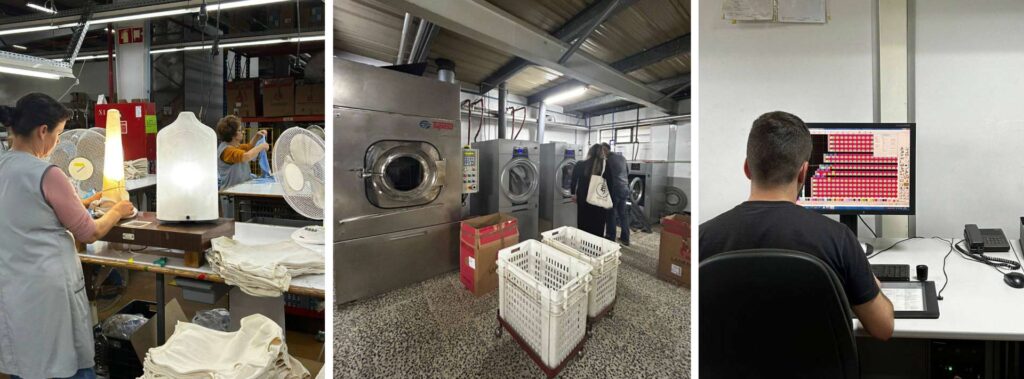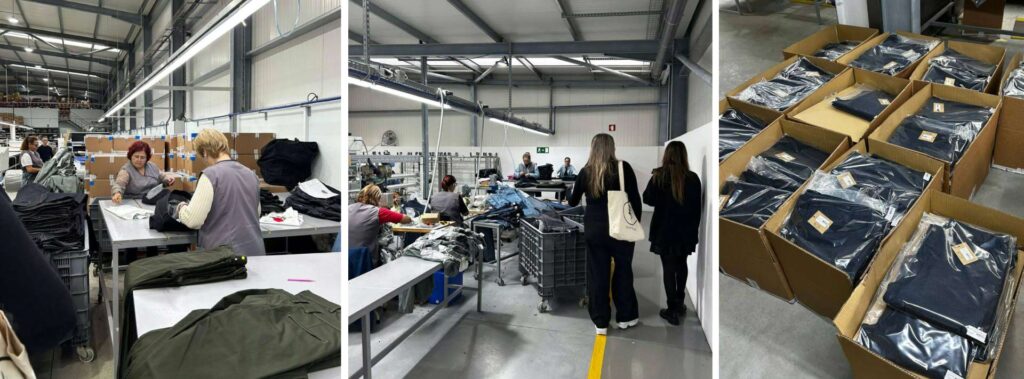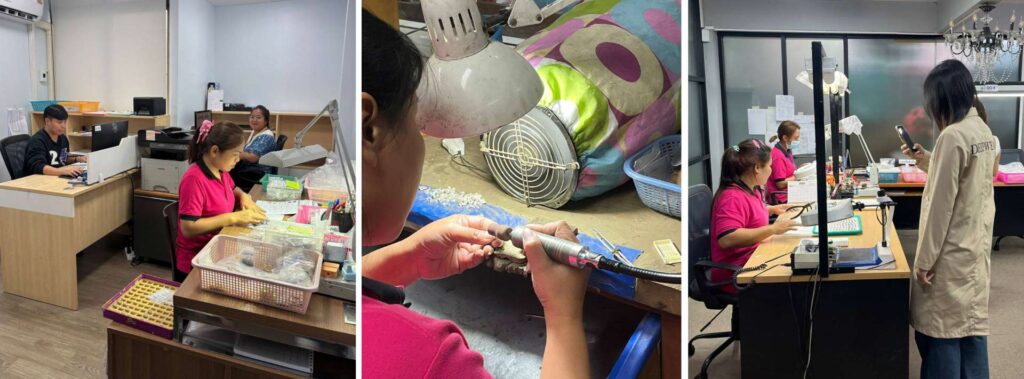Learn how fashion brands can protect worker safety and wages while building ethical, future-ready supply chains. Deepwear helps brands align style, sustainability, and human well-being.
The fashion industry is a living, breathing ecosystem—powered not only by machines but by people, plants, and animals that make up every stage of the supply chain. Yet, despite its vibrancy, the global garment sector has long been plagued by unsafe working conditions, unfair wages, and exploitative practices. Fast fashion’s relentless demand for speed and low costs often shifts the burden onto the very hands that create our clothes.
At Deepwear, we believe style and sustainability are inseparable. Our mission is to help brands navigate the complexities of ethical fashion sourcing, ensuring every garment respects the lives of those who make it.
In this blog we cover:
- The systemic challenges driving unsafe and unfair labor in global fashion supply chains
- Key health and safety risks faced by garment workers—from chemical exposure to poor working conditions
- How responsible material choices and circular economy models can protect both people and the planet
- Certifications and frameworks that promote fair wage compliance and safer production
- How Deepwear partners with brands to align style, sustainability, and social responsibility

The Systemic Challenges of Fast Fashion
Fast fashion thrives on unpredictability. Brands demand frequent design updates, large orders, and low production costs. This creates pressure for factories to cut corners, often at the expense of worker safety.
- Insecure Employment: Millions of garment workers, especially women and migrant laborers, rely on temporary, day-to-day contracts. They can be dismissed at a moment’s notice, leaving them vulnerable and unable to unionize.
- Wage Discrepancies: In countries like Bangladesh and Pakistan, minimum wages often fall far below living costs. Workers struggle to afford food, housing, and healthcare. Recent reports show that some brands’ purchasing practices prevent factories from paying legal wages, exacerbating poverty.
- Supply Chain Instability: Events like the 2024 unrest in Bangladesh highlighted how disruptions can increase mandatory overtime, delay wages, and spike transportation costs for workers. Brands that fail to plan responsibly often place the burden on laborers at the bottom of the chain.
Worker Safety and Health Risks
The risks go beyond wages. From raw material cultivation to finished garments, worker health is constantly at stake from:
- Chemical Exposure: Textile dyeing, synthetic fiber production, and recycling processes often involve hazardous substances. Inhalation or skin contact can lead to respiratory conditions, skin ailments, and long-term illnesses.
- Material-Specific Hazards: Cotton dust causes byssinosis (“brown lung disease”), while synthetics expose workers to irritants and carcinogens. Blended materials add complexity, requiring chemical-intensive recycling that can jeopardize worker safety.
- Unsafe Work Environments: Factory collapses, poor ventilation, and lack of fire safety have caused devastating accidents. Gender-based harassment and physical abuse remain widespread issues.
- Invisible Homeworkers: Millions work from home, earning below minimum wage and lacking union representation or protective labor policies.
The COVID-19 pandemic amplified these vulnerabilities, leaving workers globally without wages or safety nets.
Learn why forward-thinking fashion brands are partnering with Deepwear to solve real-world production and sourcing hurdles in our blog Why Brands Switch to Deepwear: Insights from Real Industry Pain Points.

Protecting Workers Through Smarter Material Choices
Sustainability in fashion isn’t just about protecting the planet—it’s about protecting the people who make the clothes we wear. The choices brands make in materials and production practices directly affect worker health, safety, and dignity. A few ways brands can make better choices are through:
- Choosing Bio-Based and Recycled Materials Thoughtfully:
Bio-based and recycled textiles can reduce the environmental impact of fashion, but their production must also consider worker safety. For example, handling new fibers or chemical treatments may introduce unfamiliar hazards if processes are scaled too quickly or without proper safeguards. When brands explore these materials responsibly, they can reduce the strain and risks associated with conventional textile production, while contributing to a healthier and safer work environment. Deepwear partners with brands to navigate these choices, helping them adopt innovative materials in ways that consider both environmental and human impact.
- Embedding Safety in Circular Economy Practices:
Recycling, repair, and resale initiatives are crucial to reducing textile waste, but they create new work environments where safety protocols must be deliberate. Workers involved in sorting, processing, or restoring garments can face exposure to dust, chemicals, or heavy machinery if safety measures are not integrated. Deepwear can collaborate with brands to design circular practices that protect workers at every stage, turning sustainability efforts into opportunities for safer, dignified employment.
- Leveraging Certifications and Standards for Worker Well-Being:
Recognized certifications can guide brands in creating supply chains that prioritize both ethical and safety standards. Some key frameworks include:- Fair Trade Certification: Promotes fair wages and safe working conditions
- SA8000: Global standard for socially responsible manufacturing
- Bluesign®: Addresses chemical management, environmental impact, and worker safety
- OEKO-TEX®: Reduces harmful substances in textiles, benefiting workers and consumers
- Fair Wear Foundation (FWF): Supports labor condition improvements in garment factories
- ISO 45001: International standard for occupational health and safety management
- Fair Trade Certification: Promotes fair wages and safe working conditions
Deepwear works alongside brands to integrate these frameworks thoughtfully, creating supply chains that are traceable, transparent, and ethically aligned—without compromising on quality, performance, or design. Our approach treats fashion as a living, breathing industry: one that relies on human skill and care at every stage, not just machines. By placing workers’ well-being at the center of sustainable practices, we help brands produce clothing that is stylish, responsible, and supportive of the people who make it.
Looking to strengthen worker safety and ensure ethical sourcing in your supply chain? Deepwear’s consultants can help you design transparent, compliant, and sustainable production systems that protect people and planet alike.

How Can Fashion Brands Protect Worker Safety and Ensure Fair Wages?
Fashion brands can improve worker safety by reducing chemical exposure, enforcing fair pay, and integrating certifications like SA8000, Fair Wear, and ISO 45001. Deepwear guides brands through ethical sourcing, transparent audits, and responsible material selection—helping create supply chains that protect people as much as products.
Looking Ahead: Fashion, Workers, and the Future of Innovation
The fashion industry is rapidly evolving, but one truth remains: humans are indispensable. While automation and AI can speed up cutting, stitching, or inventory management, machines cannot replicate the intuition, creativity, and careful judgment of skilled garment workers. From fine detailing in high-fashion pieces to quality checks that protect both materials and wearers, human hands and expertise remain at the core of the industry.
Emerging tech innovations are helping brands improve worker safety without sacrificing jobs. For example:
- Advanced ventilation and chemical handling systems reduce exposure to hazardous dyes and fibers.
- Ergonomic machinery and wearable sensors alert workers to repetitive strain, preventing long-term injuries.
- Smart inventory and workflow platforms streamline operations, allowing workers to focus on high-skill tasks rather than repetitive manual labor.
Meanwhile, consumer expectations are changing. Shoppers increasingly demand transparency, ethical sourcing, and garments that are both stylish and responsibly produced. Brands that fail to adapt risk losing relevance in a market that values people as much as product.
This is where Deepwear steps in as a bridge for the future. Our consultancy helps brands:
- Navigate the intersection of style, sustainability, and human-centered production.
- Adopt innovative materials and processes that protect workers while maintaining premium quality.
- Integrate circular economy practices thoughtfully, turning recycling, repair, and resale initiatives into safe, dignified work opportunities.
- Respond to market shifts and emerging regulations with agility, ensuring their supply chains are future-proof.

By constantly adapting, innovating, and creating, Deepwear is a partner not just for today’s fashion challenges, but for the industry of tomorrow—where worker safety, ethical practices, and exceptional style coexist seamlessly.
Ready to build a fashion brand that’s ethical, safe, and future-ready? Book a strategy call with Deepwear’s sustainability experts or explore our full ethical sourcing and compliance solutions today.